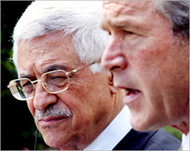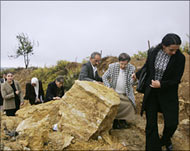Bush: No Middle East peace timetable
President George Bush has rejected calls for setting a timetable for Middle East peace, saying he was not sure that elusive goal could be reached before he leaves office in January 2009.

Speaking on Thursday after talks with Palestinian President Mahmoud Abbas at the White House, Bush said the Palestinian Authority must reject and fight terrorism for the Middle East peace process to be able to move forwards.
He said the Israeli withdrawal from Gaza and parts of the West Bank had created new opportunities and responsibilities for the Palestinians.
“The way forward must begin by confronting the threat that armed gangs pose to a genuinely democratic Palestine,” Bush said. “In the short term, the Palestinian Authority must … earn the confidence of its neighbours by rejecting and fighting terrorism,” Bush said.
For his part, Abbas, after talks with Bush, urged Israel to join the Palestinians in “a real partnership for making peace”.
Real partnership
“We are presenting, based on wide public support, our positions that call upon the Israeli side to join us in a real partnership for making peace,” Abbas said through an interpreter during a joint appearance at the White House.
Bush said he was not sure that a Palestinian state would exist by the time he leaves office in January 2009.
 |
|
Bush said Abbas (L) was a man |
“I believe that two democratic states living side by side in peace is possible. I can’t tell you when it’s going to happen. It’s happening,” Bush said.
“If it happens before I get out of office, I’ll be there to witness the ceremony. If it doesn’t, we will work hard to lay that foundation so that the process becomes irreversible,” Bush said.
Bush heaped praise on Abbas and said prospects for Palestinians gaining a state seem better than ever before.
“President Abbas is a man devoted to peace and to his people’s aspiration for a state of their own,” Bush said. “And today, the Palestinian people are closer to realising their aspirations.”
Supporting Abbas, Bush called on Israel to stop constructing settlements on the West Bank. He assured Abbas he shared his vision of two states living side by side in peace and security.
Message to Israel
“Israel should not undertake any activity that contravenes its road map obligations,” Bush said, referring to a blueprint for peacemaking approved by the US, the UN, the European Union and Russia.
Without elaboration, the president said Israel would be “held to account” for any actions that hamper peacemaking or burden the lives of Palestinians.
|
“We are presenting, based on wide public support, our positions that call upon the Israeli side to join us in a real partnership for making peace” Mahmoud Abbas, |
But Bush said he was a “heck of a lot more confident” of peace prospects than when he first took office five years ago. Both Abbas and Israeli Prime Minister Ariel Sharon are committed to making peace, he said.
Abbas, in response, insisted that Israel lift curbs on Palestinian travel in the West Bank, saying the restrictions had caused the Palestinians hardship and humiliation.
The Palestinian leader also criticised Israel’s wall, particularly its location in Jerusalem, where the Palestinians intended to establish the capital of their state.
He assured Bush that election of a Palestinian legislature in January would establish one law to govern the area.
Abbas also levelled demands on Israel.
He said Palestinians must be able to cross from Gaza, which they took over after Israel’s withdrawal last month, and the West Bank, and roadblocks must be removed, settlement construction halted and construction of a security wall suspended.
Humiliation
Abbas said the roadblocks, imposed by Israel in response to deadly attacks, “unfortunately turned the lives of Palestinians into hardship, suffering, humiliation” and is “a very sensitive issue”.
Bush also said he would ask the other members of the international peace quartet to extend the term of special envoy James Wolfensohn, the former World Bank president. He also said he would soon name a replacement for Lieutenant-General William Ward as security envoy for the region.
 |
|
Palestinians near Bethlehem pick |
“This person will take on an enhanced mission to help President Abbas and the Palestinian Authority carry out their responsibility to end terror attacks, dismantle terrorist infrastructure, maintain law and order, and one day provide security for their own state,” Bush said.
With Bush’s support, the Palestinians are a step closer to what Abbas spoke of last May in the White House Rose Garden, when he said Palestinians were “in dire need of freedom” from Israeli control.
“Abbas is someone who is in a difficult situation,” Ziad Asali, president of the private American Task Force on Palestine, said in an interview. “But he is looking to dispel the accusation that he is weak, and to show that he has a good understanding and analysis of his circumstances.”
He also wants to form a partnership with the US in resolving such issues as the Palestinian economy, Hamas and lawlessness, Asali said.
Travel ban
Israel has no plan for a permanent ban on Palestinians using major roads in the occupied West Bank, Israeli Defence Minister Shaul Mofaz said on Thursday.
He told reporters during a visit to London that Monday’s
move to bar private Palestinian vehicles from a key West Bank
highway was “not strategic, only for a while”.
The measure, which expanded a network of settler-only routes in the occupied West Bank, was taken a day after Palestinian
fighters killed three Jewish settlers in a drive-by shooting.
Mofaz said the ban would be lifted when Palestinian security
forces arrested those behind the attack.
“There is no separation of roads,” he said, adding that he
saw no security rationale for this. “The moment the terrorists
know only Israelis are moving on this road, they will attack
every car.”
A senior Israeli security source said on Wednesday the army
was discussing a plan for permanently designating some roads for separate use by Israelis and Palestinians – an idea that
Palestinians have condemned as a form of apartheid.
Palestinians see the measures, which force them onto poorly
maintained back roads, as part of Prime Minister Ariel Sharon’s
strategy of tightening Israel’s grip on West Bank settlement
blocs after pulling all 8500 settlers out of the Gaza Strip.